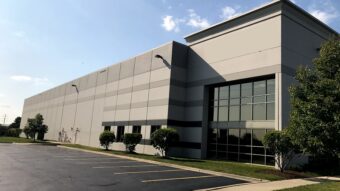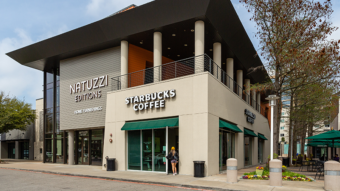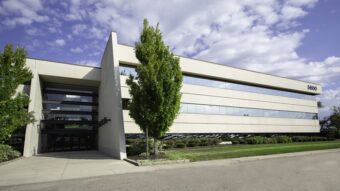Take an educated workforce and a prime location in the center of the United States. Add in a low cost of doing business and a strong interstate highway system. It’s a formula for commercial real estate success. And city that has all this? Des Moines, Iowa.
Des Moines today is seeing steady growth in commercial real estate sales, leases and development. Companies are moving here to take advantage of that strong workforce, a state government that has been friendly to new businesses and that location in the heart of the Midwest.
And in the best news of all for this Midwest city? There have been no signs that the influx of companies moving to Des Moines is ready to slow.
Just ask Paul Rupprecht, president of the brokerage subsidiary of R&R Realty Group in West Des Moines, R&R Realty Advisors.
“There are just certain things that echo through when you talk about what makes Des Moines attractive to companies,” Rupprecht said. “The highly educated workforce is a big plus. The cost of living is very reasonable in Des Moines. Companies like the idea of that. We continue to attract not just the bigger employers, but the up-and-coming companies, too.”
At the same time, development has been more measured in Des Moines. This means that there is an abundance of available land here. There is room for new development, something that bodes well for continued CRE activity throughout the region.
As in all markets, certain commercial sectors are seeing more activity than are others. In Des Moines, as in most Midwest markets, this means that the industrial market is particularly strong today.
Rupprecht points to the interstate highway system that runs through Des Moines. This makes it easy for companies to ship their products across the United States. And as customers continue to flock to online shopping, and expect the items they order to arrive at their doors in fewer days, companies are expanding their industrial presence in the Des Moines area.
“Companies are reinvesting in their businesses,” Rupprecht said. “There is a flight to quality on the industrial side. They are running updated facilities. They are investing in new development. This reinvestment is what is driving the development around the area. The industrial sector is definitely the sector of choice right now.”
This has led to the entry of at least one big developer known for its industrial work, The Opus Group, which has become busy throughout the Des Moines region.
“Seeing Opus penetrate our market, that speaks volumes about what that company thinks about Des Moines,” Rupprecht said. “Ryan Companies has been here for a while, too. We are seeing so much growth here, it is attracting the bigger developers.”
Rupprecht points, too, to the office sector as one that is particularly busy in the Des Moines market today. Businesses are outgrowing their current office space and either moving to larger spaces or developing new office space on their own.
Rupprecht said that there has been particularly robust activity among mid-size companies, those needing under 10,000 square feet of office space.
As in most Midwest markets today, much of the office activity has been concentrated in the urban center of Des Moines. This isn’t surprising: Young workers often prefer to live and work in the center of big cities. Companies that want to attract this talent need to offer office space in the heart of their cities.
Rupprecht said that new apartment units have opened in downtown Des Moines. An influx of companies to the center of the city has followed.
“For a long time, Des Moines didn’t have many housing options downtown,” Rupprecht said. “But now you are seeing an infusion of both housing and employers in downtown Des Moines. It certainly is a strong trend that we are now seeing in downtown Des Moines.”
Spencer Shireman, marketing director with R&R Realty Group, said that certain areas of Des Moines tend to be more popular among specific industries. He said, for instance, that financial companies tend to open offices in suburban Des Moines. Ad agencies, though, are moving downtown.
“It all depends on what the workforce in these businesses want,” Shireman said.
One of the benefits of doing business in Des Moines is that traffic is manageable. As Shireman says, no matter where you are, you are never more than a 30-minute drive from the metro area. This has had an impact on the industrial sector. In many big Midwest cities, companies are investing in warehouses and distribution facilities that are located ever closer to their downtown CBDs.
In Des Moines, though, this isn’t an issue, Shireman said. Companies don’t need warehouses and distribution centers located immediately outside Des Moines’ CBD. Even if they are located on the outskirts of the city, distribution centers can still move product quickly to where their Des Moines-area customers live.
Both Shireman and Rupprecht said that they expect CRE activity to remain strong in Des Moines throughout the rest of the year and well into 2020. There are certain areas of metro Des Moines that will be especially busy.
One of those is centered in nearly Urbandale, Iowa, just about seven miles outside of Des Moines. This city has become known as the Urban Loop, benefitting from several interstate highway connections. Today, both office and industrial users have descended on this area largely because it is so easy to maneuver around. Construction crews are busy upgrading the infrastructure in Urbandale, opening up thousands of acres of land for new development.
“This Urban Loop area is already having a big impact on the area,” Rupprecht said.
Des Moines University has also made news here, buying 90 acres of land to build a new campus in West Des Moines. This will open development opportunities for the 24 acres of land in Des Moines that the university will leave behind.
For Rupprecht, this continued interest in Des Moines is a sign that the commercial real estate growth the city is experiencing won’t soon slow.
“The thing about the Midwest and especially Des Moines is that we don’t have the big booms,” he said. “But we also don’t have the big drops. I think activity will continue here. The future is continually bright for Des Moines. Will things slow down eventually? At some point in time, activity might taper a little bit. There is always a little correction in any market. But we stay isolated from the major swings, so that bodes well for us.”
“The thing about the Midwest and especially Des Moines is that we don’t have the big booms,” he said. “But we also don’t have the big drops. I think activity will continue here. The future is continually bright for Des Moines. Will things slow down eventually? At some point in time, activity might taper a little bit. There is always a little correction in any market. But we stay isolated from the major swings, so that bodes well for us.”



